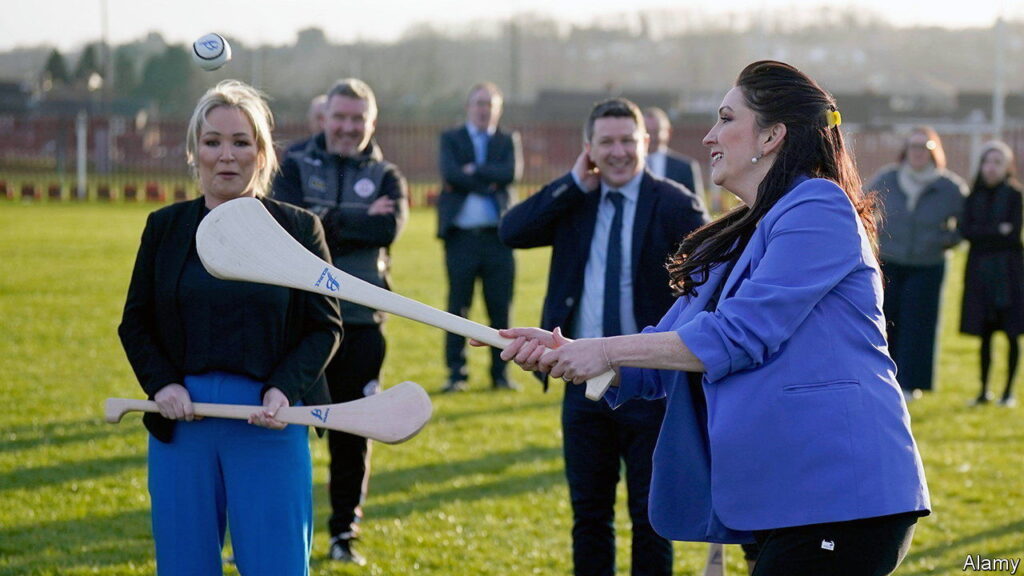a surreal atmosphere It stretches across Stormont, a hill overlooking Belfast, the seat of Northern Ireland's devolved administration. It's not a return to power-sharing government that will bother people. That's how government leaders are acting. Imagine Joe Biden and Donald Trump suddenly working together in harmony, and you feel strange.
The government was reinstated in February after a two-year hiatus following a strike by the main trade unionist (pro-British) party, the Democratic Unionist Party (DUP).of DUP It had opposed the customs and regulatory border established in the Irish Sea after Brexit, which would ensure the land border between Northern Ireland and the Republic of Ireland remained open. When the sea boundary softened, it returned to Stormont.
Decentralized governments have come and gone before. However, this time, DUP I returned to a completely different political situation. In elections held during the break, Sinn Féin, which wants a united Ireland, overtook the ruling party. DUP This means that for the first time, Northern Ireland leader Michelle O'Neill has become a first minister.
of DUP is enthusiastic about new arrangements. Deputy Prime Minister Emma Little-Pengery (her role is equally powerful, but her title is symbolic) good-naturedly challenged the Gaelic sport of hurling to the president. . tv set camera. Education Minister Paul Givan spoke several words of Irish at a school where his students were taught the language. Seven years ago he contributed to the collapse of previous devolution by cutting the meager amount of funding for Irish language scholarships. Sinn Féin has been similarly generous. Last month, Ms O'Neill stood respectfully at a football match in Northern Ireland to a rendition of 'God Save the King'.
While warm gestures are welcome, they do not guarantee success. When we had loyalist flamethrower Ian Paisley and former president Martin McGuinness; Islay The commander-in-chief led the devolved government in 2007 and his former opponents were known as the “Chuckle Brothers” for their laughing and joking manner. Less than ten months after his inauguration, Paisley was expelled from his self-founded party. The greatest vulnerabilities to power-sharing governments, then and now, come from within states. DUP. Many senior party officials did not support a return to Stormont. One party member laments: DUP“Glee'' when making symbolic compromises.
nevertheless, DUP And Sinn Féin has every reason not to overthrow Stormont again.for DUP, no government was bad for unions. Although Irish unification is not imminent, it is likely that more people in Northern Ireland will consider it as an alternative if devolution repeatedly fails. For all-Island party Sinn Féin, looking ahead to the next elections due by March 2025, the priority is to demonstrate credibility in government.
Even if there is a willingness on both sides to cooperate, the challenges ahead will be difficult. The roads in this state are full of potholes. Hospital waiting lists are the worst in the country. And teacher salaries lag far behind those in the UK. Lough Neagh, which supplies more than 40% of Northern Ireland's drinking water, is chronically contaminated.
There are few signs that the Stormont executive, which also includes ministers from the Alliance and Ulster Unionist parties, is prepared to make difficult decisions. The British government has proposed providing more than 3 billion pounds ($3.8 billion) if devolution is restored, including 113 million pounds if the executive branch would raise it from its own revenue. It also included £559m of debt cancellation. The leaders of Northern Ireland, which has the lowest household taxes in Britain, plan to raise only around £30m while demanding billions more from London.
Ulster University academic David McCann said a four-party coalition would mean a set of competing priorities. “On Monday health is prioritized, on Wednesday childcare, and on Friday uniforms are decided. As a result, instead of doing three things well, you end up doing 12 things half-heartedly. Masu.”
The executive created a positive image. But “we've seen that movie several times before,” says opposition leader Matthew O'Toole of the Social Democratic Party and Labor Party. “If the playbook does not include a credible plan to rescue public services, it is understandable that the public will quickly become cynical.” ■


